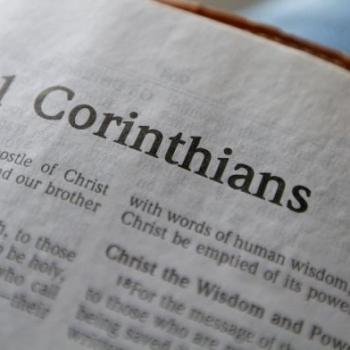You would be correct if you argued that there is a large number of things that divide evangelicals and progressives. From disagreements on social action to theology, it seems as if the list would be too long to try and cover all of the issues. However, after much thought and even more conversations with conservative evangelicals, I have narrowed these disagreements down to two ideas that seem to be the foundation for these theological disagreements.
My goal is not simply to argue against evangelicalism (the negative approach) but to argue for these two ideas instead (the positive approach) – from a progressive perspective. Taking the positive approach eliminates the need that many evangelicals feel to be defensive and can hopefully bridge the conversational chasm between the two groups. Hopefully, I will be able to articulate a clear understanding of these two ideas so that there is no misunderstanding.
As I usually do with articles like this, let me clarify a couple of things so I don’t have to field stupid questions. First, Progressives come from diverse backgrounds and therefore, oftentimes vary in their beliefs. In other words, there is no unified progressive theology like you would find in a denomination. That is because Progressive Christianity is not a denomination but an intellectual place where wanderers travel in order to unravel their faith.
Second, when I say “evangelical” I am referring to anyone who falls under David Bebbington’s definition. If you fall under this definition, then I am talking to you…
The Holy Bible
Throughout the history of Christianity, the Bible has done more to divide than it has to unify people – that includes Christians. I wish I could go into a comprehensive history of the Bible because I think if we all understand the same history, then we would be much more united than divided on the issue. Unfortunately, pastors who are not educated in historical theology have done a lot of damage in how they have taught the history of the Bible. This has trickled down to the layperson who oftentimes will believe certain things about the Bible that are untrue.
Part of the reason the Bible divides doesn’t have as much to do with the content of the Bible itself as it does with the individual trying to understand it. Two main issues cause this division.
Anachronistic Interpretations. This is when the individual is reading their present context into an ancient text. In other words, they are not reading the text as the author intended it. Reading the text this way takes the author out of context and puts words into their mouth. The only way to understand what the author is saying is by understanding the cultural nuance that accompanies the writing.
A great example of this is how many read the opening chapters of Genesis as a formula for creationism. When we read Genesis in this way we are reading our scientific ideas into a text that was in no way trying to make scientific claims. Instead, we need to read Genesis from the author’s perspective and interpret the text as the author intended it regardless if the conclusion matches our theology or not.
Literalism. In my book UNenlightenment, I make the case that reading something “literally” is not simply reading it plainly. Instead, a literal interpretation is reading the text as the author intended. Conveying the message of the author is literally a “literal” reading of the text.
When people read it “plainly” under the illusion that they are reading it literally, they formulate beliefs based solely on the propositional content. Here is an example of propositionalism:
I often hear propositionalists interpret Hebrews 11:1 as the definition of what it means to be a Christian.
Now faith is confidence in what we hope for and assurance about what we do not see.
If we simply take this verse at propositional value, then being a Christian is about what you believe. However, if you read the subsequent verses (11:2-40), then the first verse takes on a different meaning. The verses following verse 1, provide the overarching contextual framework for understanding what is being said. These verses go on to list the people of faith in the Hebrew scriptures. The verses talk about how the people of faith were people of action. That taking action on your beliefs is what constitutes faith, not simply what one believes. Moreover, our interpretation went from having certain beliefs about Jesus as what makes a person of “faith” to imitating the actions of the faithful. Furthermore, it is through imitation that demonstrates the person of faith.
Propositionalism is the result of modern interpretive methods that deplete the meaning of a text. Unfortunately, we don’t have time to go into why this is.
Believing IN Jesus or Believing Things ABOUT Him.
The second area has to do with how we define what it means to be a Christian. At the heart of the dilemma is whether or not a Christian is defined by what they believe or what they do.
In evangelicalism, belief means that an individual agrees to certain propositions. This often manifests itself in beliefs related to orthodox structures such as creeds and confessions. The ability of an individual to understand their position in the world and how that creates a need within every individual is paramount in accepting the truth of these foundational beliefs.
However, what this perspective fails to acknowledge is the differentiation between belief about Jesus and belief in Jesus. The progressive Christian identifies that simply believing certain propositions about Jesus never leads the individual to the action that is required by James 2:14-26. Therefore, the progressive Christian understands that belief in Jesus requires that Christians not only accept the fact that Jesus was who he said he was, but that this comes with the requirement of imitating the works of love that Jesus displayed while on earth (John 3:35). For the progressive, the two are indistinguishable. In other words, there is no theological differentiation made between the “works” of Jesus and his ”nature”. What Jesus did while on earth is intimately connected to who he was.
Some Final Thoughts on Evangelicals and Progressives
When I reflect on the arguments between evangelicals and progressives I found that understanding the nature of scripture and belief tends to be the major issues that separate us. There are of course ancillary issues that could be considered “hot-button” issues. Issues like universalism, social justice, etc. But, many of these issues are in some way connected to the aforementioned topics.
However, until evangelicals make a distinction between their theological and political values, there will never be any agreement between the two groups. In fact, making this distinction is so important for evangelicals they will continue their downward spiral until they understand that there has to be a difference between their theological beliefs and their ability to live within a political milieu that consists of people who believe many different things.
I wish that evangelicals would stop listening to their leaders and begin to think independently with a critical mind. I know and encounter evangelicals all of the time, and when I discuss these issues with them, they seem more accepting than their leaders are.
You can view my UNenlightenment YouTube Channel HERE
You can view my UNenlightenment Podcast HERE
You can follow me on FaceBook HERE
You can purchase the book UNenlightenment HERE.















